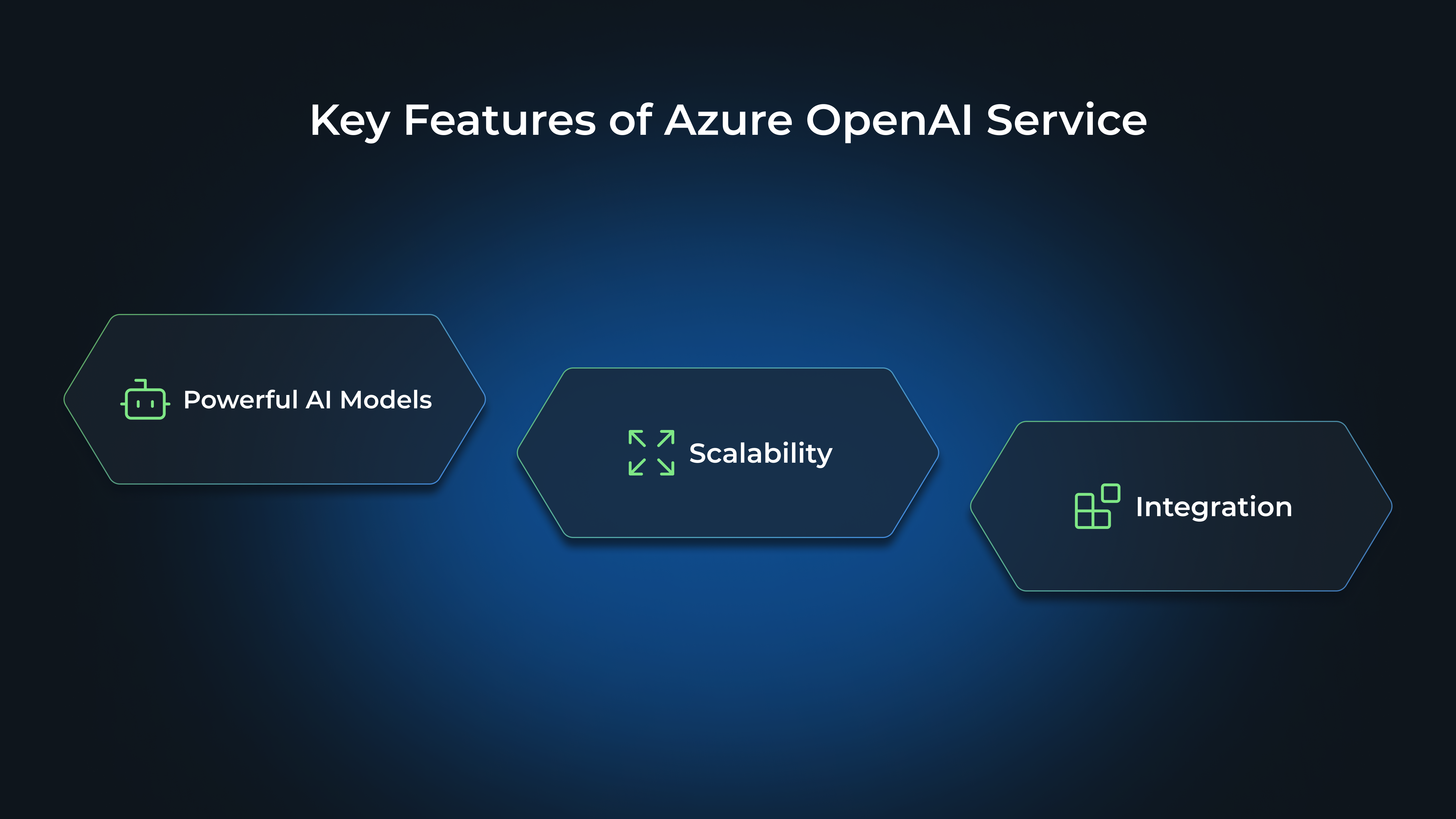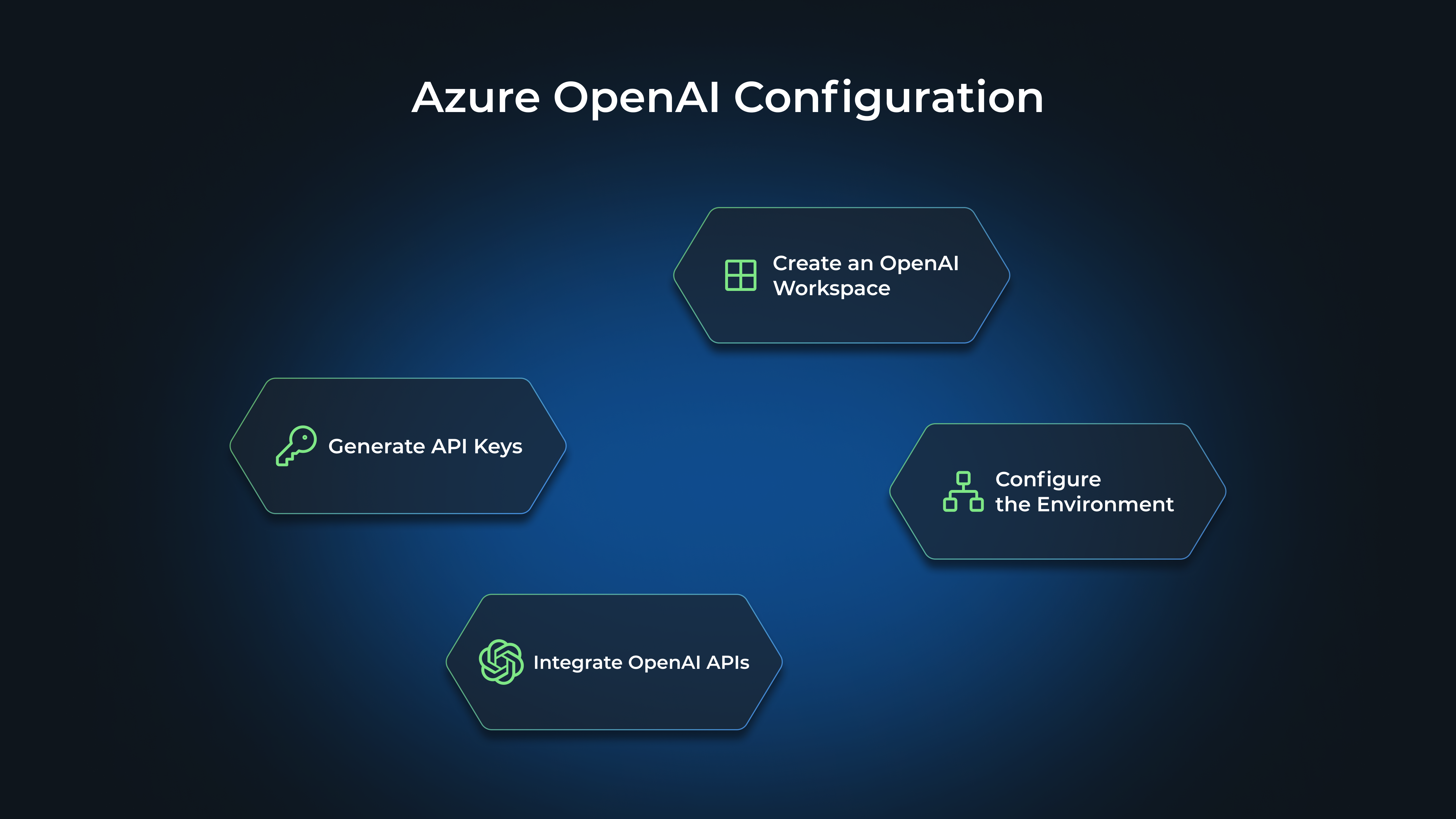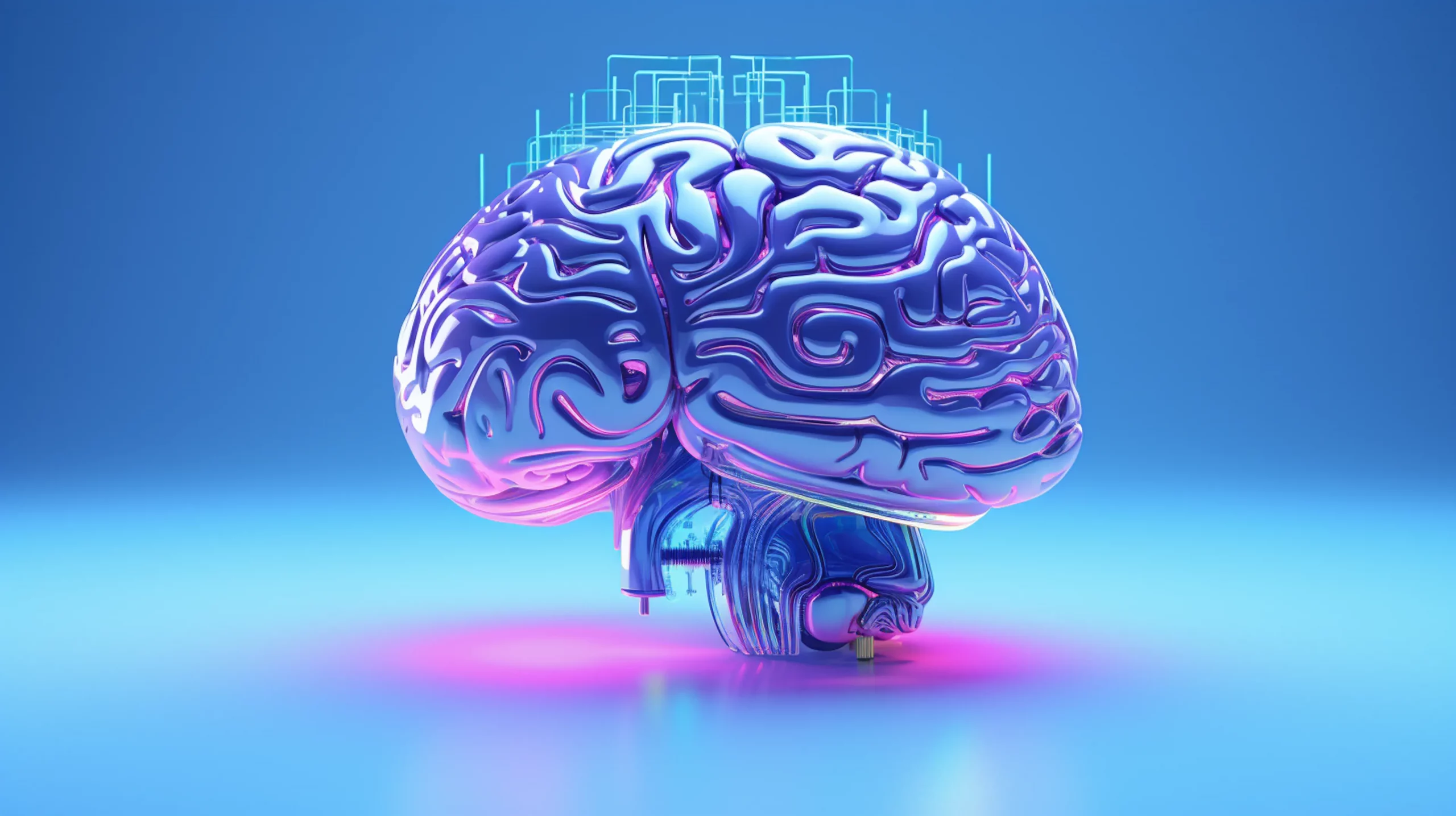We at WeSoftYou understand the growing importance of artificial intelligence (AI) in modern businesses. As a software development company with a proven track record, we recognize the need for scalable and efficient AI solutions. In this article, we will provide an overview of Azure OpenAI Service, a powerful platform that allows businesses to integrate AI capabilities into their applications with ease.
What is the Azure OpenAI Service?
In today’s fast-paced digital landscape, businesses are constantly striving to enhance customer experiences, increase productivity, and optimize operations. Azure OpenAI Service emerges as a valuable tool, enabling organizations to leverage the power of AI and accelerate their digital transformation journeys.
With Azure OpenAI Service, businesses can access advanced AI models and technologies seamlessly. It empowers developers to integrate AI capabilities, such as language understanding and text generation, into their applications using simple APIs.
Definition and Functionality of Azure OpenAI
Azure OpenAI Service is a cloud-based platform that offers pre-trained AI models and APIs for natural language processing tasks. It provides developers with the tools and resources to build intelligent applications quickly and efficiently.
Through Azure OpenAI Service, developers can tap into cutting-edge AI models, such as GPT-3 (Generative Pre-trained Transformer 3), to perform various tasks, including language translation, sentiment analysis, and text generation.
Key Features of Azure OpenAI Service

Azure OpenAI Service offers several key features that make it a preferred choice for businesses looking to leverage AI capabilities:
- Powerful AI Models: Access to industry-leading AI models, such as GPT-3, that enable developers to solve complex language processing tasks.
- Scalability: The platform is built on Azure’s robust infrastructure, allowing applications to scale effortlessly as the demand for AI services grows.
- Integration: Azure OpenAI Service seamlessly integrates with other Azure services, including Azure Cognitive Services and Azure Machine Learning, enabling developers to build end-to-end AI solutions.
One of the standout features of Azure OpenAI Service is its powerful AI models. These models, such as GPT-3, have been trained on vast amounts of data and can understand and generate human-like text. This opens up a world of possibilities for developers, as they can now create applications that can understand and respond to natural language input.
Imagine a customer service chatbot powered by Azure OpenAI Service. Instead of providing generic responses, the chatbot can analyze the customer’s query, understand the context, and generate personalized and relevant responses. This not only improves the customer experience but also reduces the workload on human customer service agents.
Scalability is another key feature of Azure OpenAI Service. As businesses grow and the demand for AI services increases, the platform can seamlessly handle the increased workload. This ensures that applications built on Azure OpenAI Service can handle a high volume of requests without compromising performance.
Integration is also a strength of Azure OpenAI Service. By integrating with other Azure services, developers can create comprehensive AI solutions. For example, by combining Azure OpenAI Service with Azure Cognitive Services, developers can build applications that not only understand and generate text but also have the ability to analyze sentiment, extract key information, and perform other cognitive tasks.
Furthermore, Azure OpenAI Service integrates with Azure Machine Learning, allowing developers to train and fine-tune AI models specific to their business needs. This level of customization enables organizations to create AI solutions that are tailored to their unique requirements.
In conclusion, Azure OpenAI Service is a powerful platform that empowers developers to leverage AI capabilities and build intelligent applications. With its advanced AI models, scalability, and seamless integration with other Azure services, Azure OpenAI Service is a valuable tool for businesses looking to accelerate their digital transformation journeys.
Azure OpenAI Implementation: Full Guide
Welcome to the world of Azure OpenAI Service! In this guide, we will walk you through the process of setting up and configuring Azure OpenAI Service. Before we dive into the details, let’s go over a few prerequisites to ensure a smooth setup experience.
Prerequisites for Azure OpenAI Setup
Before getting started with Azure OpenAI Service, there are a few prerequisites that you need to have in place:
- Azure Subscription: An active Azure subscription is required to access and utilize Azure OpenAI Service. If you don’t have one, you can sign up for a free trial or choose a suitable subscription plan.
- Resource Group: It’s a good practice to create a resource group to organize and manage the resources associated with Azure OpenAI Service. This allows for better resource management and easier collaboration within your team.
- Pricing: Familiarize yourself with the pricing details to understand the cost implications of using Azure OpenAI Service. This will help you plan your budget and optimize your usage accordingly.
Azure OpenAI Configuration: Step-by-Step

Now that you have the prerequisites covered, let’s dive into the step-by-step process of configuring Azure OpenAI Service:
- Create an OpenAI Workspace: To begin, you’ll need to create an OpenAI workspace within your Azure subscription. This workspace will serve as the central hub for managing and deploying your AI models.
- Generate API Keys: Once you have your OpenAI workspace set up, you’ll need to obtain the required API keys. These keys are essential for authenticating and accessing Azure OpenAI Service. Make sure to securely store these keys as they grant access to your resources.
- Configure the Environment: Setting up the necessary development environment is crucial for working with Azure OpenAI Service. This involves installing the OpenAI Python package and its dependencies. You can use tools like pip or conda to easily install the required packages.
- Integrate OpenAI APIs: With the environment configured, you can now start integrating the OpenAI APIs into your applications. The OpenAI Python package provides a wide range of AI models and functionalities that you can leverage to enhance your applications.
By following these steps, you’ll be well on your way to harnessing the power of Azure OpenAI Service. Whether you’re building chatbots, language translation systems, or any other AI-driven solution, Azure OpenAI Service provides the tools and infrastructure you need to bring your ideas to life. So, let’s get started and unlock the potential of AI with Azure OpenAI Service!
Azure OpenAI Capabilities
Azure OpenAI Service presents businesses with a range of capabilities to address their AI requirements effectively. Let’s dive into two key capabilities:
Language Understanding with Azure OpenAI
One of the primary uses of Azure OpenAI Service is natural language understanding. With the help of AI models like GPT-3, businesses can analyze text data, extract insights, and decipher the sentiment behind customer feedback, social media posts, or support tickets. This enables organizations to gain valuable insights into customer preferences, improve their products or services, and foster better customer relationships.
For example, imagine a company that receives a large volume of customer feedback through various channels. By utilizing Azure OpenAI’s language understanding capabilities, the company can automatically process and analyze this feedback to identify common themes or issues. This information can then be used to make informed decisions on product improvements or to address customer concerns promptly.
In addition to analyzing customer feedback, Azure OpenAI’s language understanding capabilities can also be applied to social media monitoring. By monitoring social media platforms, businesses can gain real-time insights into customer sentiment and identify any potential issues or opportunities. This allows organizations to proactively engage with customers, address concerns, and build a positive brand image.
Text Generation with Azure OpenAI
Azure OpenAI Service’s text generation capabilities unlock powerful opportunities for businesses. By leveraging state-of-the-art AI models, organizations can generate human-like text, create interactive storylines, or even automate content creation processes. This capability proves invaluable for sectors such as publishing, marketing, and customer support, where generating engaging and personalized content is essential.
For instance, in the publishing industry, Azure OpenAI’s text generation capabilities can be used to create compelling book summaries or generate ideas for new storylines. This not only saves time and effort for authors and publishers but also enhances the overall reading experience for audiences.
In the marketing field, Azure OpenAI’s text generation capabilities can be utilized to create personalized and persuasive content for advertisements or email campaigns. By tailoring the messaging to individual customers based on their preferences and past interactions, businesses can significantly increase engagement and conversion rates.
Furthermore, in customer support, Azure OpenAI’s text generation capabilities can be employed to automate responses to frequently asked questions or provide instant solutions to common issues. This not only improves response times but also frees up human agents to focus on more complex customer inquiries, ultimately enhancing the overall customer experience.
Azure OpenAI Service Management and Optimization
While Azure OpenAI Service empowers businesses with advanced AI capabilities, it is crucial to manage and optimize its performance to ensure maximum efficiency. Let’s explore some key aspects:
Azure OpenAI Performance
Monitoring the performance of Azure OpenAI Service is vital to identify potential bottlenecks and optimize resource allocation. Azure provides robust monitoring tools, such as Azure Monitor and Azure Application Insights, that enable businesses to track and analyze the service’s performance, diagnose issues, and optimize AI workloads.
With Azure Monitor, businesses can gain real-time insights into the performance of their Azure OpenAI Service. It allows them to monitor metrics like response time, throughput, and error rates. By setting up alerts and notifications, businesses can proactively identify and address any performance issues, ensuring smooth and uninterrupted AI operations.
Azure Application Insights, on the other hand, provides deeper visibility into the application’s behavior and performance. It allows businesses to track end-to-end transactions, identify slow-performing components, and analyze dependencies. With this information, businesses can make informed decisions to optimize their Azure OpenAI Service and improve overall efficiency.
Best Practices for Optimizing Azure OpenAI
From our experience, we recommend the following best practices to optimize the usage of Azure OpenAI Service:
-
- Data Preprocessing: Ensure that the input data is properly preprocessed to enhance model performance and accuracy.
Data preprocessing plays a crucial role in optimizing Azure OpenAI Service. By cleaning and transforming the input data, businesses can improve the quality of AI predictions and reduce the risk of inaccurate results. Techniques like data normalization, feature scaling, and outlier detection can be applied to ensure the data is in the right format and range for the AI models.
-
- Batch Processing: Utilize batch processing wherever possible to optimize resource usage and minimize costs.
Batch processing allows businesses to process multiple AI requests simultaneously, reducing the overall processing time and optimizing resource utilization. By batching similar requests together, businesses can take advantage of parallel processing capabilities, maximizing the efficiency of Azure OpenAI Service. This approach not only improves performance but also helps minimize costs by reducing the number of individual API calls.
-
- Model Fine-tuning: Fine-tune the AI models based on specific business requirements to improve performance and tailor results to unique needs.
Every business has unique requirements and challenges that can be better addressed by fine-tuning the AI models. By analyzing the performance of the models and collecting feedback from users, businesses can identify areas for improvement and make necessary adjustments. Fine-tuning can involve adjusting hyperparameters, adding additional training data, or modifying the model architecture to achieve better results. This iterative process helps optimize Azure OpenAI Service for specific business needs.
Security and Compliance in Azure OpenAI Service
Data security and compliance are critical considerations when utilizing AI services. Azure OpenAI Service offers robust security features and adheres to industry standards:
Azure OpenAI Security Features
Azure OpenAI Service employs various security measures to safeguard data and ensure privacy. These measures include encrypted data transmission, access control through Azure Active Directory, and compliance with industry security best practices.
When it comes to data security, Azure OpenAI Service prioritizes the protection of sensitive information. It utilizes encryption techniques to ensure that data is transmitted securely between the user and the service. This means that even if intercepted, the data remains unreadable and inaccessible to unauthorized individuals.
In addition to encrypted data transmission, Azure OpenAI Service also implements access control through Azure Active Directory. This allows organizations to manage user access and permissions effectively. By leveraging Azure Active Directory, businesses can ensure that only authorized individuals have access to the AI service, reducing the risk of data breaches.
Furthermore, Azure OpenAI Service is designed to comply with industry security best practices. This includes regular security audits, vulnerability assessments, and penetration testing. By continuously monitoring and improving security measures, Azure OpenAI Service aims to stay ahead of emerging threats and provide a secure environment for users.
Standards in Azure OpenAI Service
Azure OpenAI Service adheres to multiple compliance standards, including but not limited to ISO 27001, HIPAA, and GDPR. These certifications validate Azure’s commitment to data privacy, security, and regulatory compliance.
ISO 27001 is an internationally recognized standard for information security management systems. By obtaining this certification, Azure OpenAI Service demonstrates its dedication to implementing and maintaining a comprehensive framework for managing information security risks.
In addition to ISO 27001, Azure OpenAI Service also complies with HIPAA (Health Insurance Portability and Accountability Act) regulations. This is particularly important for organizations operating in the healthcare industry, as HIPAA sets strict guidelines for protecting sensitive patient data.
Furthermore, Azure OpenAI Service is GDPR (General Data Protection Regulation) compliant. GDPR is a regulation that aims to protect the privacy and personal data of European Union citizens. By adhering to GDPR requirements, Azure OpenAI Service ensures that user data is handled securely and in accordance with the regulation’s principles.
By adhering to these compliance standards, Azure OpenAI Service provides organizations with the assurance that their data is handled with the utmost care and in compliance with relevant regulations. This enables businesses to confidently leverage the power of AI while maintaining data security and regulatory compliance.
Future of Azure OpenAI Service
Azure OpenAI Service is continuously evolving, and future developments hold promising opportunities for businesses:
Upcoming Developments in Azure OpenAI
Microsoft, in collaboration with OpenAI, is actively working on expanding the capabilities of Azure OpenAI Service. The goal is to provide users with even more powerful and efficient AI models that can handle complex tasks with ease. These developments will not only improve AI model performance but also introduce new models that cater to a wide range of industries and use cases.
In addition to model enhancements, Azure OpenAI Service is also focusing on enhancing integration with other Azure services. This integration will enable businesses to seamlessly incorporate AI capabilities into their existing workflows and systems, further streamlining their operations.
With these upcoming developments, Azure OpenAI Service is set to become an even more comprehensive and versatile platform for businesses looking to leverage AI technologies.
Impact of Azure OpenAI on AI Industry
As AI becomes increasingly central to various industries, the availability of a powerful and user-friendly platform like Azure OpenAI Service holds immense significance. It empowers businesses to leverage AI capabilities without significant investments in building and training complex AI models from scratch.
This democratization of AI eliminates barriers to entry and catalyzes AI adoption across sectors. Businesses of all sizes can now access state-of-the-art AI technologies, enabling them to drive innovation, improve operational efficiency, and fuel business growth.
Azure OpenAI Service is particularly beneficial for senior decision-makers, founders, CTOs, and CEOs who are looking to harness the potential of AI. By leveraging the capabilities of Azure OpenAI Service, these leaders can unlock new revenue streams, gain a competitive edge, and future-proof their organizations.
Furthermore, the integration of advanced language understanding and text generation functionalities offered by Azure OpenAI Service opens up a world of possibilities. Businesses can create personalized customer experiences, automate content generation, and enhance their overall communication strategies.
In conclusion, Azure OpenAI Service delivers unmatched AI capabilities, empowering businesses to integrate advanced language understanding and text generation functionalities seamlessly. With WeSoftYou’s expertise in software development, you can unlock the full potential of Azure OpenAI Service and embark on your AI journey with confidence.
FAQ
Azure OpenAI Service is a cloud-based platform that offers pre-trained AI models and APIs for natural language processing tasks. It enables developers to integrate powerful AI capabilities into their applications with ease.
Our platform provides a wide range of AI models, including those for language understanding, text generation, and sentiment analysis. These models have been trained on vast amounts of data and are continuously updated to ensure optimal performance.
With Azure OpenAI Service, you can unlock the power of AI and leverage it to enhance your applications and services.
Azure OpenAI Service empowers businesses to leverage advanced AI capabilities, such as language understanding and text generation, to enhance customer experiences, improve operational efficiency, and drive innovation.
By integrating our AI models into your applications, you can automate various tasks, such as chatbots for customer support or content generation for marketing campaigns. This not only saves time and resources but also allows you to provide personalized and engaging experiences to your customers.
Furthermore, our platform offers scalability, allowing you to handle large volumes of data and requests without compromising performance. This scalability ensures that your applications can handle increasing user demands and provide a seamless experience.
With Azure OpenAI Service, you can stay ahead of the competition and unlock new opportunities for growth and success.
Yes, Azure OpenAI Service prioritizes data security and compliance. We understand the importance of protecting your data and ensuring privacy.
Our platform employs rigorous security measures, including encryption and access controls, to safeguard your data from unauthorized access. We also adhere to industry-leading compliance standards, such as GDPR and HIPAA, to ensure that your data is handled responsibly.
Additionally, we provide comprehensive monitoring and auditing capabilities, allowing you to track and analyze the usage of our AI models. This transparency ensures that you have full visibility into how your data is being processed.
At Azure OpenAI Service, we are committed to providing a secure and trustworthy platform for all your AI needs.
Contact us at WeSoftYou for a free consultation or project estimation. Our team of experts is ready to help you leverage Azure OpenAI Service and unlock the power of AI for your business.
Whether you have specific questions or need guidance on how to integrate our AI models into your applications, we are here to assist you every step of the way.
Don’t miss out on the opportunity to revolutionize your business with Azure OpenAI Service. Contact us today!






















